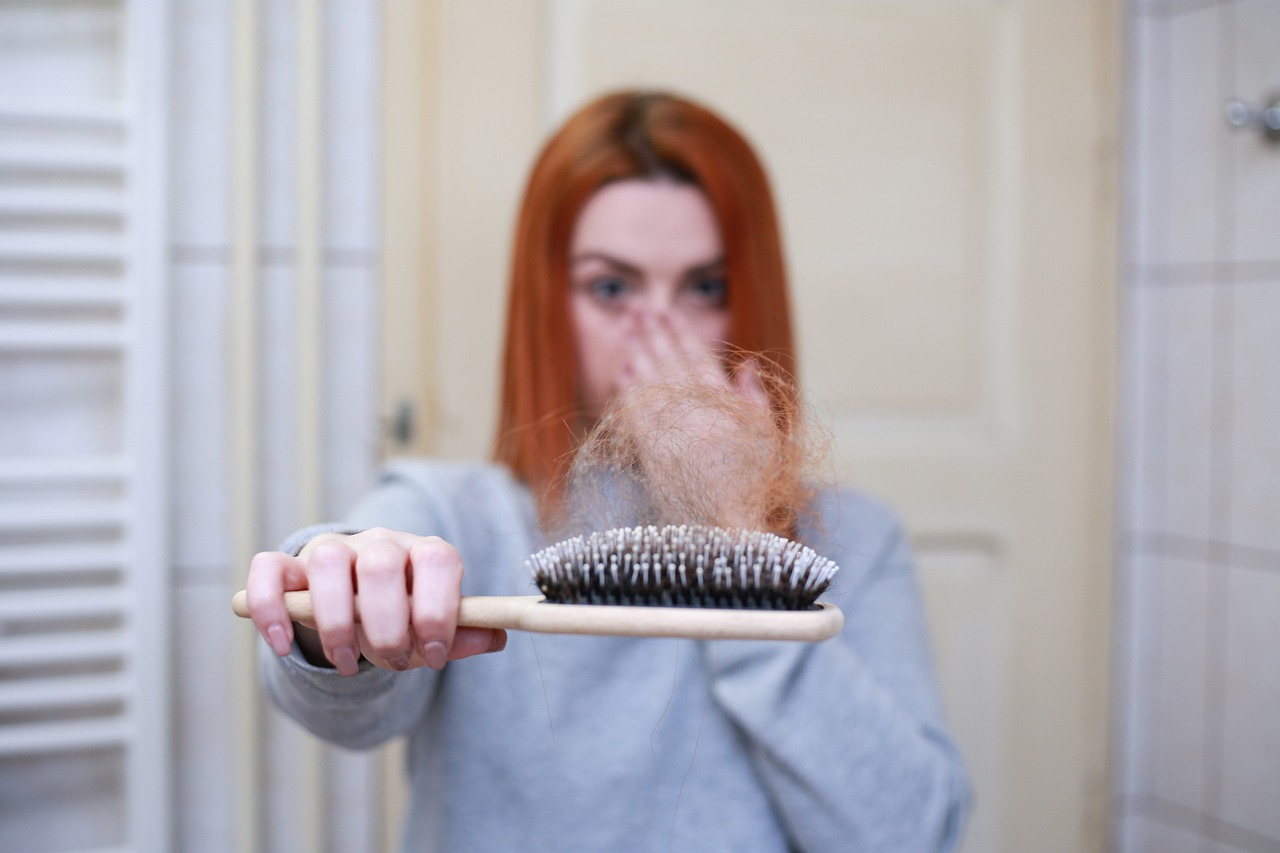
Pulling out your hair is one thing. Losing it is another. At least if you are pulling it out, you can take steps to manage your schedule, change your lifestyle, or get some mental health help. If your hair is falling out, it’s like a mystery cloud has fallen upon you.
Slowly you start to notice handfuls of hair, piles on your pillowcase, and hairs stuck like pet hair all over your clothes. This is not good, and you don’t know what to do.
Then you start to worry- how long is this going to last? Is all of my hair going to fall out? Is it going to come back?
Menopause and Hair Loss: What You Need to Know
For most women, hair is something that is easily controlled. It may be a pain in the butt sometimes, but it’s controllable.
You cut it. You style it. You choose how to wear it.
For many women, their hair is a physical expression that is deeply tied to who they are and how they feel about themselves.
Losing hair can be scary because it feels like you are losing control, you may feel less feminine, and your self-esteem may take a dive.
Unfortunately, if you’re a woman, you don’t always have control over the changes that your hair is going through. If you’ve ever been pregnant, then you’re already familiar with how hormones can change how your hair feels and looks and how curly it is. The same thing happens with many women during perimenopause and menopause.
Menopause and Hair Loss: What Happens?
The first thing that happens is that you see a change in hair pattern. Then the volume and condition of your hair change. Not in a good way.
Then you may notice that you don’t have as much hair growth in certain places that you used to. Then come the signs of hair loss.
If you have a severe case of hair loss, you may notice that your hair is thinning at the crown or the sides of your head. You may even notice that your hair is thinning all over your head. Severe thinning of the hair has a name. Maybe you’ve heard of male pattern baldness?
Well, with women, it’s called female pattern hair loss (FPHL). Notice the difference between the names? That’s because women rarely go bald unless they have a medical condition or are undergoing chemotherapy.
Why is My Hair Falling Out?
Unfortunately, female hair loss is a fact of life. If you live a long life, you’re going to lose some hair.
Just the facts, ma’am.
- Hair loss can happen anytime during your life.
- Ethnicity has nothing to do with it.
- Hair loss increases with age.
- Hair loss is common.
- Age is a factor.
- You can do everything right, but losing your hair is still not always in your control.
- Genetics is a big part of hair loss. If a family member had FPHL, then you may have it too.
- Acute stress on the body like illness, crash dieting, or emotional stresses will kick your hair cuticles to the curb.
- Medications can cause hair loss too.
- It happens most often after menopause.
Although it’s not the only cause of FPHL, you’ll probably lose the most hair around the time you hit menopause. The transition into menopause usually starts in the late forties and completes in the fifties.
Studies have shown that the reason you lose hair during menopause is because of a hormonal imbalance. During perimenopause and menopause, your estrogen and progesterone levels decrease. There’s the problem!
Estrogen and progesterone are responsible for making your hair grow faster and stay on your head. That means that when these hormone levels drop, growth slows down, and your hair thins out. Another set of little devilish hormones that affect hair loss is a group of male hormones called androgens.
When estrogen and progesterone decrease, the production of androgens increases. Androgens cause your hair follicles to shrink, which results in hair loss.
The real bummer is that androgens can also increase hair growth on your face! Ahhhh!!!!! Remember grandma and her peach fuzz? Or that little hair sprouting from her chin. It could happen to you too!
Never fear. This will not be a permanent condition
Nothing is Wrong! This Isn’t Permanent!
If you are peri-menopausal or menopausal and you’re losing your hair at a ridiculous rate, there’s probably nothing medically wrong with you. You’ll want to check with your doctor, though, to talk about any dietary deficiencies, stressful events, or illnesses that may have triggered the hair loss. Your doctor will also want to rule out other causes and test you for conditions such as anemia, low ferritin, thyroid dysfunction, raised testosterone levels, or skin disorders.
If you are going through the change and your doctor hasn’t already tested your sex hormone levels, then they will probably do that too, especially if you’ve got other signs and symptoms of hormone imbalance like irregular periods, acne, hot flashes, or night sweats. Most menopause-related hair loss does slow down with time, so you probably won’t lose all of your hair.
Want to Keep the Hair You Have and Grow Back More?
If you’re not interested in watching your hair fall out and waiting for your head to stop shedding or your hair to grow back, talk with your doctor about hormone optimization.
Hormone optimization therapy works by adding the hormones that you lack into your system to bring the balance back. Once you increase the estrogen and progesterone levels, the androgen levels will go back to pre-peach fuzz face levels, and your hair follicles will return to normal. Hormone optimization can also reduce the other sucky symptoms you may be experiencing like:
- Hot flashes
- Night sweats
- Brain fog
- Insomnia
- Irregular periods
- Mood swings
- Bloating
- And more
Are you experiencing hair loss?
Ready to Retake Control? Speak with a Specialist
Schedule your FREE 15-minute consultation and discover the most comprehensive and affordable wellness solutions with Elite Health! Our prices are up to 60% lower than the big box providers!
